仁爱英语九年级上册期中考单项选择练习70道
仁爱版九年级英语上册期中测试试卷含答案
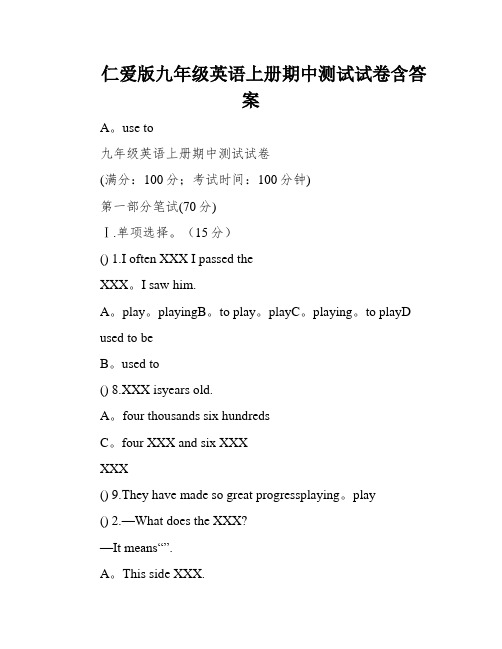
仁爱版九年级英语上册期中测试试卷含答案A。
use to九年级英语上册期中测试试卷(满分:100分;考试时间:100分钟)第一部分笔试(70分)Ⅰ.单项选择。
(15分)() 1.I often XXX I passed theXXX。
I saw him.A。
play。
playingB。
to play。
playC。
playing。
to playD used to beB。
used to() 8.XXX isyears old.A。
four thousands six hundredsC。
four XXX and six XXXXXX() 9.They have made so great progressplaying。
play() 2.—What does the XXX?—It means“”.A。
This side XXX.No Parking() 3.When the player finished running。
he was out of. A。
XXXXXX() 4.—How about going hiking this weekend? —Sorry。
XXX.A。
to stay at home。
go outB。
to go out。
stay at home C。
staying at home。
go outD。
going out。
stay at home () 5.—We really XXX any more when shopping.—It’XXX.A。
So does it.B。
With pleasure.C。
That’s OK.D.So it is.() 6.——XXX.A。
Where have you gone?B。
Where did you go to the supermarket?C。
Where have you been?D。
Where’s Wang Fang? () 7.Iafraid of the dark。
仁爱版九年级英语上册期中测试试卷1
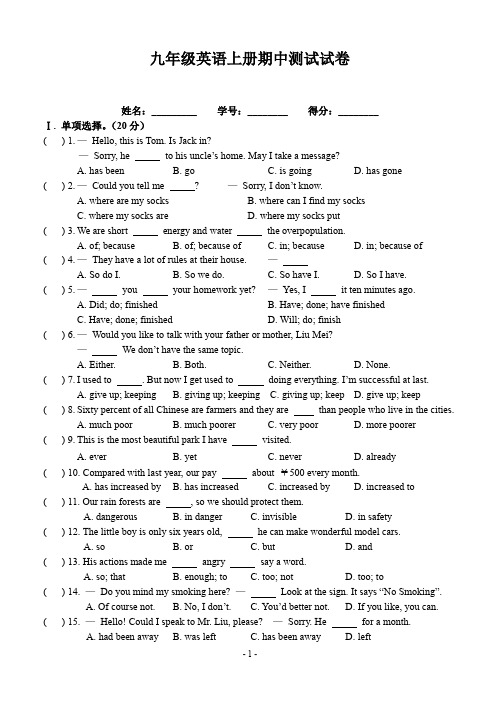
九年级英语上册期中测试试卷姓名:_________ 学号:________ 得分:________Ⅰ. 单项选择。
(20分)( ) 1. —Hello, this is Tom. Is Jack in?—Sorry, he to his uncle’s home. May I take a message?A. has beenB. goC. is goingD. has gone( ) 2. —Could you tell me ? —Sorry, I don’t know.A. where are my socksB. where can I find my socksC. where my socks areD. where my socks put( ) 3. We are short energy and water the overpopulation.A. of; becauseB. of; because ofC. in; becauseD. in; because of ( ) 4. —They have a lot of rules at their house. —A. So do I.B. So we do.C. So have I.D. So I have.( ) 5. —you your homework yet? —Yes, I it ten minutes ago.A. Did; do; finishedB. Have; done; have finishedC. Have; done; finishedD. Will; do; finish( ) 6. —Would you like to talk with your father or mother, Liu Mei?—We don’t have the same topic.A. Either.B. Both.C. Neither.D. None.( ) 7. I used to . But now I get used to doing everything. I’m successful at last.A. give up; keepingB. giving up; keepingC. giving up; keepD. give up; keep ( ) 8. Sixty percent of all Chinese are farmers and they are than people who live in the cities.A. much poorB. much poorerC. very poorD. more poorer( ) 9. This is the most beautiful park I have visited.A. everB. yetC. neverD. already( ) 10. Compared with last year, our pay about ¥500 every month.A. has increased byB. has increasedC. increased byD. increased to( ) 11. Our rain forests are , so we should protect them.A. dangerousB. in dangerC. invisibleD. in safety( ) 12. The little boy is only six years old, he can make wonderful model cars.A. soB. orC. butD. and( ) 13. His actions made me angry say a word.A. so; thatB. enough; toC. too; notD. too; to( ) 14. —Do you mind my smoking here? —Look at the sign. It says “No Smoking”.A. Of course not.B. No, I don’t.C. You’d better not.D. If you like, you can. ( ) 15. —Hello! Could I speak to Mr. Liu, please? —Sorry. He for a month.A. had been awayB. was leftC. has been awayD. left( ) 16. ---How many __________ can you see in the following pictures ? --- Three .A. boysB. animalsC. filmsD. buildings( ) 17.It is _________ today than yesterday . Shall we go swimming this afternoon ?A. the hottestB. hotC. hottestD. hotter( ) 18.Listen ! Some of the girls ________ about Harry Potter . Let’s join them !A. are talkingB. talkC. will talkD. talked( ) 19. It ________ Jack twenty minutes _________ the math problem yesterday.A.took, to work out B.takes, to work outC.has taken, working out D.is taking, working out( ) 20."Where is Amy?""She _________ the teacher's office."A.has been to B.has gone to C.is gone to D.is been i nⅡ. 情景交际。
2024年全新九年级英语上册期中试卷及答案(仁爱版)
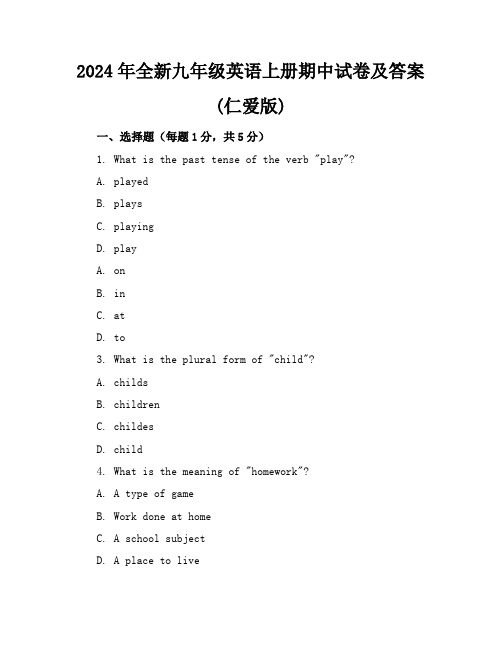
2024年全新九年级英语上册期中试卷及答案(仁爱版)一、选择题(每题1分,共5分)1. What is the past tense of the verb "play"?A. playedB. playsC. playingD. playA. onB. inC. atD. to3. What is the plural form of "child"?A. childsB. childrenC. childesD. child4. What is the meaning of "homework"?A. A type of gameB. Work done at homeC. A school subjectD. A place to liveA. goB. goesC. am goingD. went二、判断题(每题1分,共5分)1. The word "book" is a noun. (√)2. The word "run" is a verb. (√)3. The word "happy" is an adjective. (√)4. The word "with" is a preposition. (√)5. The word "the" is an article. (√)三、填空题(每题1分,共5分)1. I have two _______ (sister).2. He is _______ (happy) today.3. They _______ (go) to the park yesterday.4. The cat is _______ (on) the table.5. I like _______ (apple).四、简答题(每题2分,共10分)1. What is your favorite subject in school? Why?2. Describe your best friend.3. What do you usually do on weekends?4. Write a short paragraph about your last holiday.5. What is your favorite season? Why?五、应用题(每题2分,共10分)1. Write a sentence using the word "library".2. Write a question using the word "where".3. Write a sentence using the word "play".4. Write a sentence using the word "because".5. Write a sentence using the word "many".六、分析题(每题5分,共10分)1. Analyze the sentence: "The sun is shining brightly today." Identify the subject, verb, and object.2. Analyze the sentence: "She is reading a book." Identify the subject, verb, and object.七、实践操作题(每题5分,共10分)1. Write a dialogue between two friends discussing their favorite hobbies.2. Write a short story about a trip to the zoo.八、专业设计题(每题2分,共10分)1. Design a poster promoting a school event.2. Create a recipe for a healthy snack.3. Write a script for a short play about friendship.4. Design a book cover for your favorite book.九、概念解释题(每题2分,共10分)1. Explain the concept of photosynthesis.2. Define the term "gravity".3. Describe the process of digestion.4. Explain the concept of renewable energy.5. Define the term "biodiversity".十、思考题(每题2分,共10分)1. How does exercise affect your physical and mental health?2. What are the advantages and disadvantages of social media?4. What are the causes and effects of climate change?5. How can you show appreciation and gratitude to others?十一、社会扩展题(每题3分,共15分)1. Discuss the importance of education in society.3. Explain the role of teamwork in achieving goals.4. Discuss the benefits of cultural diversity.5. Analyze the challenges and opportunities of urbanization.一、选择题答案:1. A2. C3. B4. B5. A二、判断题答案:1. √2. √3. √4. √5. √三、填空题答案:1. sisters2. happy3. went4. on5. apple四、简答题答案:1. My favorite subject in school is math because it challenges me and helps me improve my problemsolving skills.2. My best friend is kind, supportive, and always therefor me. We share similar interests and have a great time together.3. On weekends, I usually go to the park, play sports,and spend time with my family and friends.4. Last holiday, I went to the beach with my family. We swam, built sandcastles, and had a great time together.5. My favorite season is summer because it's warm, sunny, and I can go outside and enjoy outdoor activities.五、应用题答案:1. The library is a place where you can find books, study, and do research.2. Where did you go on vacation last year?3. I like to play basketball with my friends after school.4. She bought a new car because her old one broke down.六、分析题答案:1. The sentence "The sun is shining brightly today." has the subject "The sun," the verb "is shining," and the adverb "brightly."2. The sentence "She is reading a book." has the subject "She," the verb "is reading," and the object "a book."七、实践操作题答案:1. Dialogue:Student 1: Hi, how are you?Student 2: I'm good, thanks. How about you?Student 1: I'm doing well. What do you like to do in your free time?Student 2: I enjoy playing the guitar and listening to music.Student 1: That's cool. I like playing soccer and reading books.Student 2: Yeah, I like reading too. Have you read any good books lately?Student 1: Yes, I just finished reading "To Kill a Mockingbird." It was amazing.2. Short Story:Once upon a time, there was a little boy named Tim who loved animals. One day, Tim went to the zoo with his family. They saw many interesting animals like lions, tigers, and bears. Tim was fascinated the colorful birds and the playful monkeys. He even got to feed the giraffes. Tim had awonderful time at the zoo and couldn't wait to go back again.各题型所考察学生的知识点详解及示例:一、选择题:考察学生对英语词汇和语法的理解,如名词、动词、时态等。
仁爱版九年级上册英语期中试卷及答案
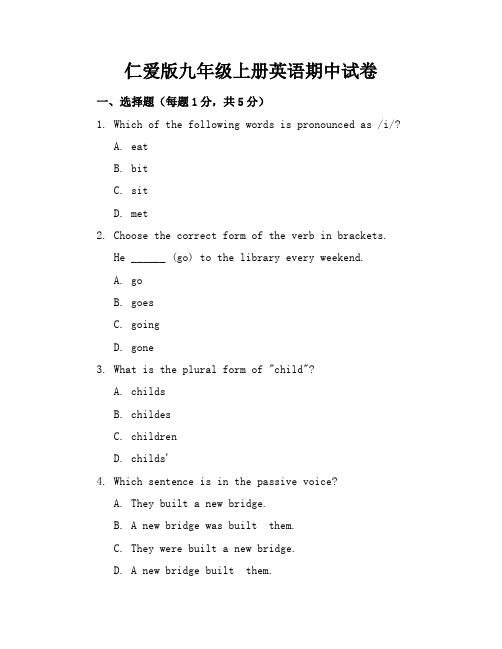
仁爱版九年级上册英语期中试卷一、选择题(每题1分,共5分)1. Which of the following words is pronounced as /i/?A. eatB. bitC. sitD. met2. Choose the correct form of the verb in brackets. He ______ (go) to the library every weekend.A. goB. goesC. goingD. gone3. What is the plural form of "child"?A. childsB. childesC. childrenD. childs'4. Which sentence is in the passive voice?A. They built a new bridge.B. A new bridge was built them.C. They were built a new bridge.D. A new bridge built them.I usually go to school ______ bus.A.B. withC. onD. in二、判断题(每题1分,共5分)6. "Climb" and "climbed" are the same verb in different tenses. ( )7. "She doesn't have any money" means the same as "Shehas no money". ( )8. "He can't do it" means that he is not allowed to do it. ( )9. "I didn't do anything yesterday" means that I did something else yesterday. ( )10. "The sun rises in the east" is an active sentence. ( )三、填空题(每题1分,共5分)11. I ______ (to see) a movie last night.12. ______ you like some coffee?13. He ______ (to travel) around the world next year.14. We ______ (to visit) the museum last week.15. ______ you speak English?四、简答题(每题2分,共10分)16. What is the past simple tense of "write"?17. What is the opposite of "expensive"?18. What is the past participle of "go"?20. What is the superlative form of "happy"?五、应用题(每题2分,共10分)21. Translate the following sentence into English: "她昨天买了一本书。
2024年全新初三英语上册期中试卷及答案(仁爱版)

2024年全新初三英语上册期中试卷及答案(仁爱版)一、选择题(每题1分,共5分)1. Which of the following words is NOT a noun?A. HappinessB. LovelyC. BookD. WaterA. GoB. WentC. GoneD. Going3. Which sentence is punctuated correctly?A. Its raining outsideB. It's raining, outsideC. It's raining outside,D. It's raining outside.4. What is the past participle of the verb "write"?A. WroteB. WrittenC. WriteD. Writes5. Choose the correct question tag for the sentence: "She can speak English, _______ she?"A. Can'tB. CouldC. ShouldD. Isn't二、判断题(每题1分,共5分)1. The word "happy" is an adjective. ( )2. The sentence "They are going to the movies tomorrow" is in the past tense. ( )3. The phrase "as soon as possible" means "in a short time". ( )4. The word "put" is a transitive verb. ( )三、填空题(每题1分,共5分)1. _______ is the capital city of France.2. I _______ my keys yesterday and couldn't find them.3. She _______ to the store every weekend to buy groceries.4. The sun _______ in the east and sets in the west.5. If it _______ tomorrow, we will stay at home.四、简答题(每题2分,共10分)1. What is the difference between a noun and a verb?2. What is the past tense of the verb "do"?4. What is the correct order of adjectives in a sentence?五、应用题(每题2分,共10分)1. Write a sentence using the past perfect tense.2. Identify the subject and predicate in the following sentence: "The cat is sleeping on the couch."3. Correct the punctuation in the sentence: "She said I look tired"4. Change the following sentence into the passive voice: "The teacher gave us a quiz."5. Use the word "however" to connect two sentences: "Iwas tired. I went to bed early."六、分析题(每题5分,共10分)1. Analyze the following sentence and identify the partsof speech: "The quick brown fox jumps over the lazy dog."2. Explain the difference between "its" and "it's" and provide an example sentence for each.七、实践操作题(每题5分,共10分)1. Write a short paragraph describing your favorite holiday.2. Translate the following sentence into English: "Elperro es el mejor amigo del hombre."八、专业设计题(每题2分,共10分)1. 设计一个简单的英语学习计划,包括每天的学习内容和目标。
仁爱版九年级上册《英语》期中考试卷及答案【可打印】
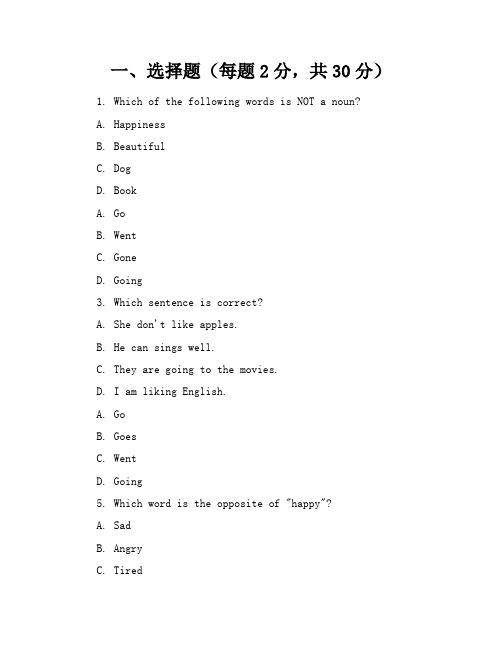
一、选择题(每题2分,共30分)1. Which of the following words is NOT a noun?A. HappinessB. BeautifulC. DogD. BookA. GoB. WentC. GoneD. Going3. Which sentence is correct?A. She don't like apples.B. He can sings well.C. They are going to the movies.D. I am liking English.A. GoB. GoesC. WentD. Going5. Which word is the opposite of "happy"?A. SadB. AngryC. TiredD. ExcitedA. WhoB. WhatC. WhereD. Why7. Which sentence is in the past tense?A. I eat an apple.B. She runs every morning.C. They watched a movie last night.D. He is reading a book.二、判断题(每题1分,共20分)1. Apples are a type of fruit. (True/False)2. The sun sets in the east. (True/False)3. Birds can fly. (True/False)4. There are 7 days in a week. (True/False)5. Elephants are small animals. (True/False)6. Water boils at 100 degrees Celsius. (True/False)7. A triangle has four sides. (True/False)8. The sky is green. (True/False)9. Lions are the king of the jungle. (True/False)10. The earth is flat. (True/False)三、填空题(每空1分,共10分)1. _______ is the capital city of France.2. A _______ is an animal with stripes.3. _______ is the opposite of hot.4. I _______ to the store yesterday.5. She _______ a book every evening.四、简答题(每题10分,共10分)1. Describe your favorite hob and explain why you enjoy it.五、综合题(1和2两题7分,3和4两题8分,共30分)1. Write a short story using at least 5 different verbs.2. Describe your dream vacation destination and explain why you would like to visit it.3. Explain the water cycle and its importance to Earth's ecosystem.4. Describe the steps you would take to solve a math problem.(考试时间:90分钟,满分:100分)八、完形填空题(每题2分,共20分)阅读下面的短文,从下面四个选项中选出最佳答案。
仁爱版九年级上册《英语》期中考试卷及答案【可打印】
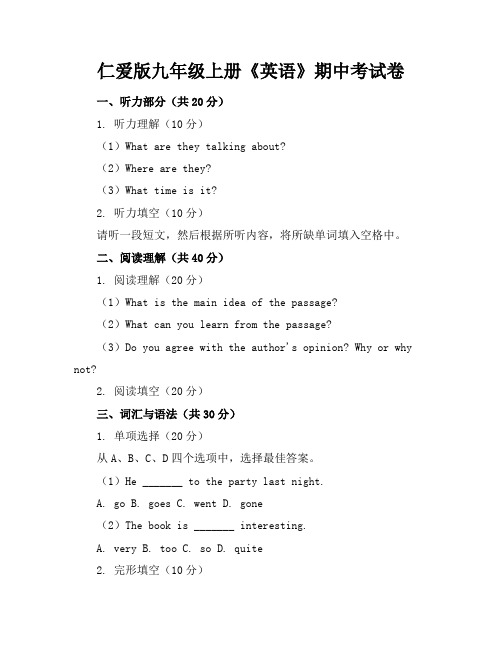
仁爱版九年级上册《英语》期中考试卷一、听力部分(共20分)1. 听力理解(10分)(1)What are they talking about?(2)Where are they?(3)What time is it?2. 听力填空(10分)请听一段短文,然后根据所听内容,将所缺单词填入空格中。
二、阅读理解(共40分)1. 阅读理解(20分)(1)What is the main idea of the passage?(2)What can you learn from the passage?(3)Do you agree with the author's opinion? Why or why not?2. 阅读填空(20分)三、词汇与语法(共30分)1. 单项选择(20分)从A、B、C、D四个选项中,选择最佳答案。
(1)He _______ to the party last night.A. goB. goesC. wentD. gone(2)The book is _______ interesting.A. veryB. tooC. soD. quite2. 完形填空(10分)四、写作部分(共10分)提示:请描述你最喜欢的一部电影或书籍,并说明原因。
仁爱版九年级上册《英语》期中考试答案【可打印】一、听力部分1. 听力理解(1)他们正在谈论一部电影。
(2)他们在电影院。
(3)现在是晚上8点。
2. 听力填空(1)movie(2)cinema(3)8 o'clock二、阅读理解1. 阅读理解(1)文章的主要思想是人们应该珍惜时间。
(2)我们可以从文章中学到时间的重要性。
(3)我同意作者的观点,因为时间确实很宝贵。
2. 阅读填空(1)important(2)value(3)time三、词汇与语法1. 单项选择(1)C(2)D2. 完形填空(1)A(2)C四、写作部分(略)一、听力部分1. 听力理解答案:A、B、C知识点:考查学生对听力材料的理解能力,包括主题、地点、时间等基本信息。
2024年最新仁爱版九年级英语(上册)期中考卷及答案(各版本)
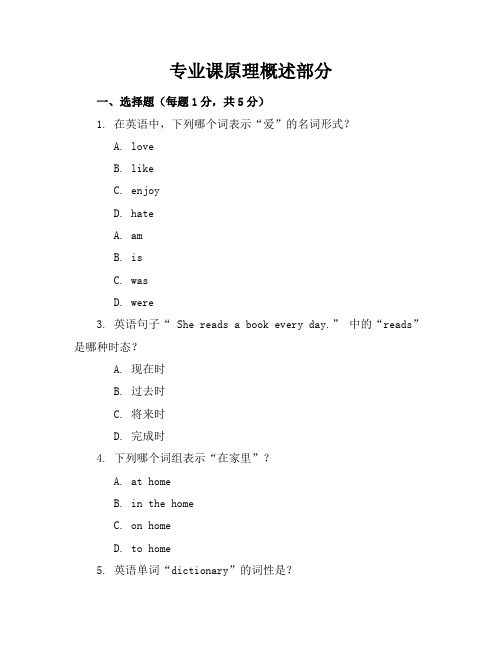
专业课原理概述部分一、选择题(每题1分,共5分)1. 在英语中,下列哪个词表示“爱”的名词形式?A. loveB. likeC. enjoyD. hateA. amB. isC. wasD. were3. 英语句子“ She reads a book every day.” 中的“reads”是哪种时态?A. 现在时B. 过去时C. 将来时D. 完成时4. 下列哪个词组表示“在家里”?A. at homeB. in the homeC. on homeD. to home5. 英语单词“dictionary”的词性是?A. 名词B. 动词C. 形容词D. 副词二、判断题(每题1分,共5分)1. 英文句子的基本结构通常包含主语、谓语和宾语。
()2. 英语中,所有名词的首字母都需要大写。
()3. “I am” 和“I’m” 都可以用来表示“我是”。
()4. 英文中的问号“?”用于句子的开头。
()5. 英语单词“watch”既可以作名词也可以作动词。
()三、填空题(每题1分,共5分)1. The sun _______ in the sky.2. I _______ to the movies last night.3. He is _______ than his brother.4. If it _______ tomorrow, we will go to the park.5. My mother can _______ a cake.四、简答题(每题2分,共10分)1. 请写出英语中三种基本句型。
2. 简述现在进行时的构成。
3. 什么是主语?请举例说明。
4. 请写出“我喜欢吃苹果”的英文翻译。
5. 英语中的定冠词和不定冠词分别是什么?五、应用题(每题2分,共10分)1. 请将下列句子改为一般疑问句:“She likes apples.”2. 请用过去时完成句子:“He _______ his homework before dinner.”3. 请将下列句子改为否定句:“They can swim.”4. 请用“either…or…”完成句子:“You can _______ coffee _______ tea.”5. 请用“not…until…”完成句子:“I _______ go to bed_______ I finished my homework.”六、分析题(每题5分,共10分)1. 分析下列句子的时态和语态:“The book was written him last year.”2. 请解释下列短语并给出例句:“look forward to”七、实践操作题(每题5分,共10分)1. 请根据下列提示编写一段对话:A. 两个朋友在谈论周末的计划。
仁爱版九年级英语期中测试卷.docx
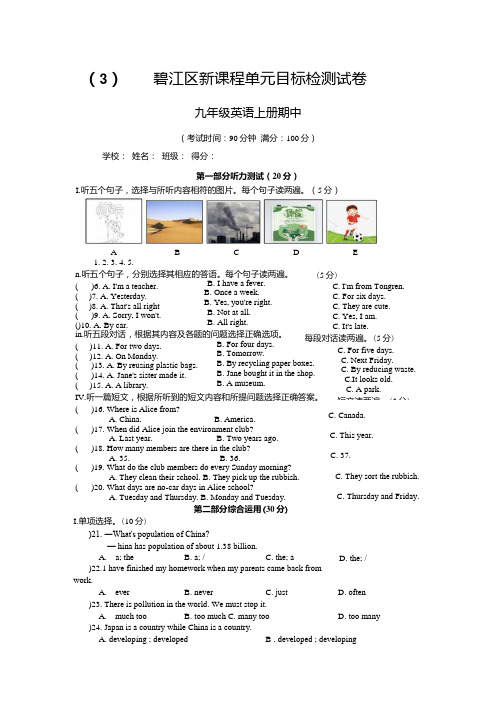
(3) 碧江区新课程单元目标检测试卷九年级英语上册期中(考试时间:90分钟 满分:100分)学校: 姓名: 班级: 得分:第一部分听力测试(20分)I.单项选择。
(10分))21. ―What's population of China? — hina has population of about 1.38 billion.A. a; theB. a; /C. the; a )22.1 have finished my homework when my parents came back fromwork.A. everB. neverC. justD. often)23. There is pollution in the world. We must stop it.A. much tooB. too muchC. many tooD. too many )24. Japan is a country while China is a country.A. developing ; developed B . developed ; developingA B C D 1. 2. 3. 4. 5.n.听五个句子,分别选择其相应的答语。
每个句子读两遍。
( )6. A. I'm a teacher. ( )7. A. Yesterday. ( )8. A. That's all right ( )9. A. Sorry, I won't. ()10. A. By car. B. I have a fever. B. Once a week. B. Yes, you're right. B. Not at all. B. All right. in.听五段对话,根据其内容及各题的问题选择正确选项。
( )11. A. For two days. ( )12. A. On Monday. ( )13. A. By reusing plastic bags. ( )14. A. Jane's sister made it. ( )15. A. A library. IV.听一篇短文,根据所听到的短文内容和所提问题选择正确答案。
仁爱版英语九年级上册-期中复习同步练习-(含答案)
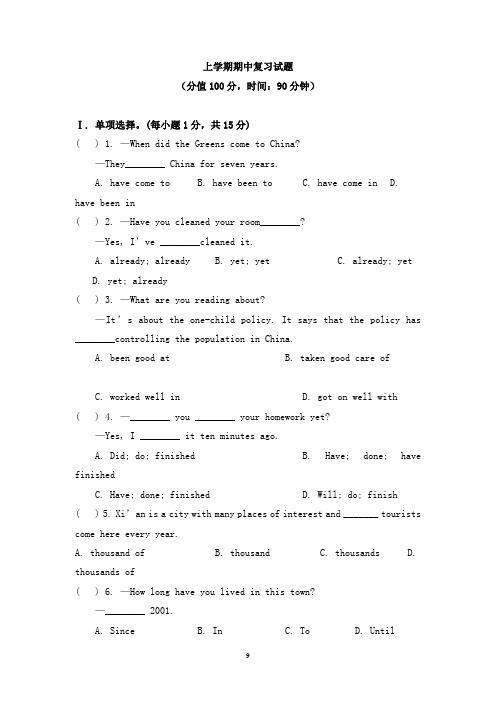
上学期期中复习试题(分值100分,时间:90分钟)Ⅰ. 单项选择。
(每小题1分,共15分)( ) 1. —When did the Greens come to China?—They________ China for seven years.A. have come toB. have been toC. have come inD. have been in( ) 2. —Have you cleaned your room________?—Yes, I’ve ________cleaned it.A. already; alreadyB. yet; yetC. already; yetD. yet; already( ) 3. —What are you reading about?—It’s about the one-child policy. It says that the policy has ________controlling the population in China.A. been good atB. taken good care ofC. worked well inD. got on well with( ) 4. —________ you ________ your homework yet?—Yes, I ________ it ten minutes ago.A. Did; do; finishedB. Have; done; have finishedC. Have; done; finishedD. Will; do; finish( ) 5. Xi’an is a city with many places of interest and _______ tourists come here every year.A. thousand ofB. thousandC. thousandsD. thousands of( ) 6. —How long have you lived in this town?—________ 2001.A. SinceB. InC. ToD. Until( ) 7. What can we students do ________ the environment?A. to protectB. protectedC. protectingD. protects( ) 8. —Do you know him?—I’m sure I’ve seen him ________, but I can’t remember the right place.A. anywhereB. nowhereC. everywhereD. somewhere( ) 9. It’s a good song, ________ the lyrics(歌词)are not good enough.A. whichB. althoughC. andD. so( ) 10. —You look so happy!—Jack says I am pretty. ________has ever told me that before.A. SomebodyB. AnybodyC. EverybodyD. Nobody ( ) 11. There are many differences between American English and British English in spelling and pronunciation, especially in ________ English.A. writtenB. oralC. officialD. business( ) 12. —Excuse me, Miss Smith, could you tell me how to improve my spoken English?—OK. The best way is to practice .A. as soon as possibleB. as quickly as possibleC. as much as possibleD. as clearly as possible ( ) 13. —I don’t know ________ remember the new English words.—Don’t worry! Try thinking about their pronunciations.A. what toB. how toC. where toD. when to ( ) 14. —I have worked hard at English, but it seems that I haven’t made any progress.—Keep on ________ at it, and you will be successful.A. workB. workingC. to workD. works( ) 15. —Our school is beautiful!—It will be more beautiful if more trees and grass ________ by us.A. plantB. plantsC. is plantedD. are plantedⅡ. 完形填空(每小题1分,共10分)根据短文内容从A、B、C、D四个选项中选出一个能填入相应空格内的最佳答案。
最新仁爱版九年级英语上册期中测试题(含答案)
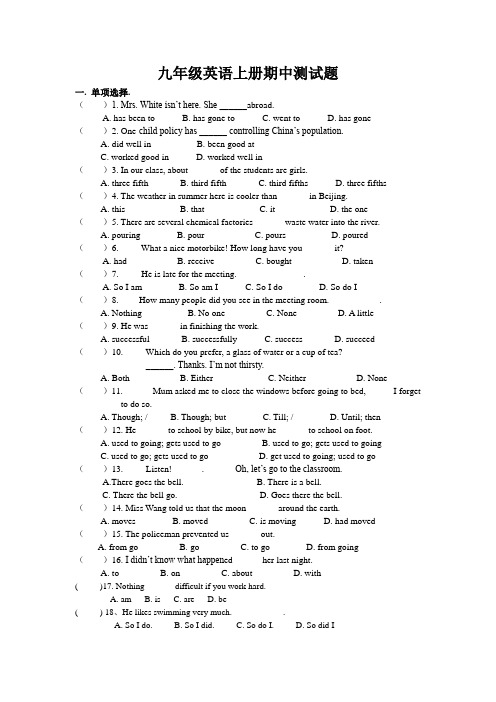
九年级英语上册期中测试题一. 单项选择.()1. Mrs. White isn’t here. She ______abroad.A. has been toB. has gone toC. went toD. has gone()2. One-child policy has ______ controlling China’s population.A. did well inB. been good atC. worked good inD. worked well in()3. In our class, about ______ of the students are girls.A. three fifthB. third fifthC. third fifthsD. three fifths()4. The weather in summer here is cooler than ______ in Beijing.A. thisB. thatC. itD. the one()5. There are several chemical factories ______ waste water into the river.A. pouringB. pourC. poursD. poured()6. ------ What a nice motorbike! How long have you ______ it?A. hadB. receiveC. boughtD. taken()7. ------ He is late for the meeting. ------ ______.A. So I amB. So am IC. So I doD. So do I()8. ------How many people did you see in the meeting room. ------ ______.A. NothingB. No oneC. NoneD. A little()9. He was ______ in finishing the work.A. successfulB. successfullyC. successD. succeed()10. ------ Which do you prefer, a glass of water or a cup of tea?------ ______. Thanks. I’m not thirsty.A. BothB. EitherC. NeitherD. None()11. ______Mum asked me to close the windows before going to bed, _____ I forget to do so.A. Though; /B. Though; butC. Till; /D. Until; then()12. He ______ to school by bike, but now he ______ to school on foot.A. used to going; gets used to goB. used to go; gets used to goingC. used to go; gets used to goD. get used to going; used to go()13. ------ Listen! ______. ----- Oh, let’s go to the classroom.A.There goes the bell.B. There is a bell.C. There the bell go.D. Goes there the bell.()14. Miss Wang told us that the moon ______ around the earth.A. movesB. movedC. is movingD. had moved()15. The policeman prevented us ______ out.A. from goB. goC. to goD. from going()16. I didn’t know what happen ed ______her last night.A. toB. onC. aboutD. with( )17. Nothing ______ difficult if you work hard.A. amB. isC. areD. be( ) 18、He likes swimming very much. ----_______.A. So I do.B. So I did.C. So do I.D. So did I( )19. Two years has passed since I ______ you the fir st time.A. meetB. have metC. metD. had met( )20. ---Do you think it will rain next week?---________. It’s rained a whole week. I don’t like it.A. I’m afraid soB. I hope notC. So it will( )21. ---Look! Miss Mu is on the other side of the street.---It _______ be her. She’s gone to Tibet.A. mustn’tB. shouldn’tC. can’t( )22. ---What do you think of the new film?---Wonderful. It’s _______interesting ________exciting.A. not only, but alsoB. neither, norC. not, but( )23. ---Remember, boys and girls. ____you work, ____ result you will get.---Thank you, Miss Yang. We’ll remember your words for ever.A. The better, the harderB. The harder, the betterC. Harder, better( )24. What’s __________ people in Australia?A. the number ofB. a number ofC. number( )25. Mrs. King has __________China for over 3 years.A. gone toB. been toC. been in( )26. ─ Have you ever __________ my stamps?─ Yes, I __________ them on your desk yesterday.A. saw; sawB. saw; seenC. Seen; saw二. 完型填空The world is divided into two main parts, the poor and the ____41__ . The poor countries ___42___ “the developing countries”, whic h have special ___43___. Sometimes the land is too poor to grow anything ___44___. Many people never get enough food ___45___, and the children starve(饿死). Help should be given by the rich countries, but rich countries have problems, ___46___. The air isn’t fresh and the rivers are ___47___ dirty to swim in or ___48___ water from. Also the roads are too ___49___ to drive along. And sometimes, large numbers of people ___10___ not have pleasant houses to live in. So something will have to be done about the problems.41. A. rich B. richer C. good D. poorer42. A. is called B. are called C. calls D. calling43. A. friends B. problems C. places D. conditions44. A. on B. in C. among D. at45. A. to play with B. to live in C. to eat D. to drink46. A. already B. also C. either D. too47. A. very B. too C. really D. so48. A. to taking B. take C. taking D. takes49. A. crowd B. crowds C. crowded D. crow50. A. does B. do C. did D. Have三.阅读理解.(A)Can plants eat people? Probably not, but there are many plants that eat meat. Some of them are big, and they can eat small animals. One famous meat-eating plant is the Venusflytrap(捕蝇草).The Venus flytrap is a very strange plant. It grows in dry parts of the United States. Its leaves are like the pages of a book. They can open and close very quickly. Inside the leaves, there are three small hairs. If a fly(苍蝇) touches one of the hairs, the leaf closes quickly. The fly cannot get out. In about half an hour, the leaf presses the fly until it is dead. Then, the plant covers the fly. Slowly, the plant eats the fly.Why do plants do it? Most plants get what they need from the sun, the air and the ground. In some places, the ground is very poor. It doesn’t have all these important things, especially nitrogen(氮). Animal meat has a lot of nitrogen, so some plants eat meat to get what they need. Let’s hope that some of the bigger plants don’t get the same idea!51. The Venus flytrap is a kind of .A. plantB. animalC. foodD. meat52. The Venus flytrap grows in .A. most parts of the worldB. some parts of AfricaC. dry parts of the United StatesD. wet parts of England53. From the passage, we learn that .A. all plants can eat peopleB. all plants can eat animalsC. some plants can eat peopleD. some plants can eat animals54. The underlined word “presses” probably means in Chinese.A. 挤压B. 关上C. 打开D. 松开55. Why do some plants eat animal meat? Because .A. plants are dangerous to animalsB. animals are dangerous to plantsC. plants want to get what they need from animal meatD. Plants want to protect themselves against animalsBHow I sudy EnglishI often hear some students say English is difficult, and it gives them a headache. So th ey can’t learn it well. But English is very easy for me. I’m good at it. I’m very glad to tell you something about how I study English.First, I think an intrest(爱好) in English is very important. When I was in Grage One, we had a new subject—English. It was fresh for me. I was interested in it, so I worked hard at it. Soon we had an English exam and I got a very good mark. How happy I was! After that, I learned English harder and harder. Our English teacher often teaches us English songs, the songs sound nice. I often think how interesting English is!Second, I think English is a foreign language. I should learn it well in the following ways:listen to the teacher carefully,speak bravely, read aloud and have a good vocabulary (词汇). Then practice again and again,never be tired. And I also have a good habit:Asking Whenever (无论何时) I have a question, I must make it clear by asking our English teacher. How happy I am when I understand!Besides this, I often read English stories, jokes, and easy novels. From this I know English is not only interesting, but also useful. They help me understand a lot of things. So to do more reading is an important way to learn English well.And I also do some exercises from our class magazines, and I often write English diaries.English has become a close friend of mine.Now I have learned English for more than two years. I always keep the first position in our school. From these words, I hope every student can learn English well.( )56.Why do some students often “have a headache”?A.Because they are easy to catch cold.B.Because it’s often very cold.C.Because they think English is easy.D.Because they don’t think English is easy. ( )57.The writer tells us that we should be ___________ in Engliish if we want to learn it well.A.interstB.interestedC.interestingD.strict( )58.The sentence “ I got a very good mark” means ___________.A.I got a good wayB.I had a good idea.C.I did badly in the examD.I did well in the exam.( )59.The writer thinks English is interesting because ____________.A.English is full of storiesB.English is full of jokesC.his teacher often teaches them nice English songs.D.of nothing( )60.Which of the following is not the way the writer studies by?A.speaking bravelyB.wrting to foreign friendsC.Reading aloudD.Wrting English diaries四.句型转换61. The meeting began 15 minutes ago.(同义句转换)The meeting has ______ ______ for 15 minutes.62. I have lived in Shanghai since I was born.(对划线部分提问)______ ______ have you live in Shanghai?63. Air pollution is harmful to our health.(同义句转换)Air pollution ______ ______ to our health.64. 你和他都是对的。
仁爱版九年级英语上册期中检测试题(附答案)
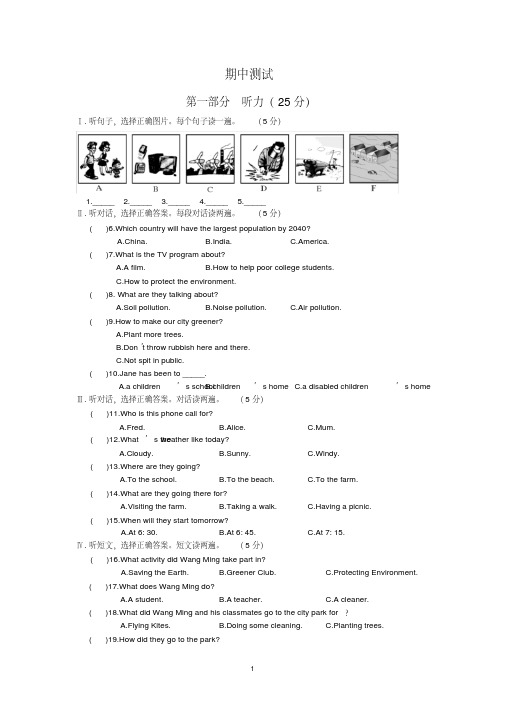
期中测试第一部分听力(25分)Ⅰ.听句子,选择正确图片。
每个句子读一遍。
(5分)1._____2._____3._____4._____5._____Ⅱ.听对话,选择正确答案。
每段对话读两遍。
(5分)( )6.Which country will have the largest population by 2040?A.China.B.India.C.America.( )7.What is the TV program about?A.A film.B.How to help poor college students.C.How to protect the environment.( )8. What are they talking about?A.Soil pollution.B.Noise pollution.C.Air pollution.( )9.How to make our city greener?A.Plant more trees.B.Don’t throw rubbish here and there.C.Not spit in public.( )10.Jane has been to _____.B.children’s homeC.a disabled children’s homeA.a children’s schoolⅢ.听对话,选择正确答案。
对话读两遍。
(5分)( )11.Who is this phone call for?A.Fred.B.Alice.C.Mum.weather like today?( )12.What’s theA.Cloudy.B.Sunny.C.Windy.( )13.Where are they going?A.To the school.B.To the beach.C.To the farm.( )14.What are they going there for?A.Visiting the farm.B.Taking a walk.C.Having a picnic.( )15.When will they start tomorrow?A.At 6: 30.B.At 6: 45.C.At 7: 15.Ⅳ.听短文,选择正确答案。
九年级仁爱英语期中测试卷

九年级英语第一学期期中试题一、单项选择(每题1分;共15分)( ) 1. —Oh, Miss Wei. Your skirt looks nice. Is it new?—No, I it since three years ago.A. hadB. boughtC. have hadD. have bought( ) 2. —He hasn’t finished reading the book.—_______A. Neither do I.B. Neither have I.C. So have I.D. So do I.( ) 3. —Do you have to finish the work now?—Yes, I do. ______I’ll fall behind others.A. AndB. OrC. ButD. So( ) 4. —the population of the U.S.A. in 2005?—It about 296 million.A. What is; isB. What was; wasC. How many is; wasD. How many was; is( ) 5. —Have you returned the library book ?—Yes, I’ve returned it.A. already; alreadyB. yet; yetC. already; yetD. yet; already( ) 6. —How many students in your class?—Fourty-five. of the students boys.A. Two fifth; areB. Two fifths; areC. Second fifths; isD. Two five; is( ) 7. Miss Gao has taught us English two years. I have been here two years ago.A. since; forB. since; sinceC. for; sinceD. for; for( ) 8. As parents, we should provide our children with food and clothes care for their minds and behavior.A. between; andB. either; orC. neither; norD. not only; but also( ) 9. We are short energy and water the overpopulation.A. of; becauseB. of; because ofC. in; becauseD. in; because of( ) 10. —you your homework yet?—Yes, I it ten minutes ago.A. Did; do; finishedB. Have; done; have finishedC. Have; done; finishedD. Will; do; finish( ) 11. We have been good friends for many years, we often keep with each other.A. for touchB. with touchC. in touchD. to touch( ) 12. —I asked her, “Do you study English here?”—I asked her she studied English there.A. thatB. whatC. ifD. how( ) 13. —Hi, Bob! I can’t find my history book. Have you seen it ?—Sorry, I haven’t. Why don’t you ask Jim? Perhaps he has seen it.A. somewhereB. every whereC. nowhereD. anywhere( ) 14. —Did you go to the Shanghai EXPO during the summer holidays?—Yes. It’s very crowded. visitors came to visit it every day.A. The millions ofB. Million ofC. Millions ofD. Million( ) 15. —Which of the two notebooks will you buy, Lisa?—I’ll buy _____ of them, so I can give one to my little sister.A. neitherB. noneC. eitherD. both二、完形填空(每题1分;共10分)Do you think that the population problem may be the greatest one of the world today? 2000 years ago, the world’s population was very 16 . For several thousand years it grew quite slowly.17 during the last three or four hundred years it has grown very 18 . Today it is growing faster than 19 before.In one minute 20 200 babies will be born in the world. Just think how many 21 there will be in the year!A UN report said that the population of the more 22 countries had been 1,214 million in 1990. It is said that 23 the year 2010, the world’s population may be 7 billion. This means much more food 24 be produced. We must have smaller families with 25 , but healthier children. If we don’t do something like this, there will not be enough space for anybody else to stand on the earth.( )16. A. many B. small C. much D. large( )17. A. But B. And C. For D. So( )18. A. slowly B. mostly C. nearly D. quickly( )19. A. never B. ever C. just D. already( )20. A. nearly B. mostly C. or so D. more( )21. A. another B. more C. other D. the other( )22. A. develops B. developed C. developing D. develop( )23. A. for B. on C. by D. during( )24. A. may B. can C. need D. must( )25. A. few B. fewer C. little D. less三、阅读理解(每题2分;共40分)AIn most parts of the world, many students help their school make less pollution. They join in “environment(环境) clubs”. In an environment club, people work together to make our environment clean.Here are the things students often do.Turn off the water! Do you know that some toilets can waste(浪费) twenty to forty tons of water an hour?In a year, that would fill a small river! In environment clubs, students mend those broken toilets.No-car day.On a no-car day, nobody comes to school in a car—not the students and not the teachers! Cars give pollution to our air, so remember:Walk, jump, bike or run.Use your legs! It’s lots of fun!No-garbage(垃圾) lunches. How much do you throw away after lunch? Environment clubs ask students to bring their lunches in bags that can be used again. Every week they will choose the classes that make the least garbage and report them to the whole school!We love our environment. Let’s work together to make it clean!( ) 26. After mending the broken toilets, they save .A. a small riverB. a lot of waterC. a toiletD. a year( ) 27. On a no-car day, will take a car to school.A. only studentsB. only teachersC. both students and teachersD. neither students nor teachers( ) 28. Environment clubs ask students .A. to run to school every dayB. to play sports every dayC. not to throw away lunch bagsD. not to forget to take cars( ) 29. From this passage we know the students usually have lunch .A. at schoolB. in clubsC. at homeD. in shops( ) 30. The writer wrote the passage to tell students to .A. join in clubsB. help teachersC. make less pollutionD. clean schoolsBWhy do plants grow in some places and not in others? Why does some land have so much growing on it, while other land has almost no plants growing on it at all?To grow, plants need several things. One is warmth. In very cold places almost nothing grows. Plants also need water. In very dry parts of the Earth only a few unusual plants can grow. That's why dry deserts everywhere are almost not covered by trees or grass.Plants must also have a place in which to put down their roots and grow. They find it difficult to grow on hard land. The town is built on hard land. The plants here have only the soil found between the cracks of the stones to grow in.Another thing plants must have before they can grow is food.What will happen if we try to make things grow on the sandy beach? A few plants, such as beach grass, will grow in sand, but most plants won't. Even if the weather is warm enough and we water the plants each day, many of them will die because the sand on this beach has almost no food for plants. ( )31. A ccording to the passage, plants need things to grow well.A. twoB. threeC. fourD. five( )32. What does the underlined word "cracks" mean in the text?A. 缝隙B. 表面C. 夹层D. 底部( )33. From the passage, we can know it is for plants to grow in dry places.A. easyB. difficultC. impossibleD. important( )34. The reason why most plants can't grow on the sandy beach is that .A. there isn't enough sunlightB. there is too much waterC. it is too crowded thereD. it has little food for plants( )35. The passage can most probably be found in a book.A. scienceB. historyC. travelD. mathCSuppose you work in a big company and find English very important for your job. Now you are looking for a place where you can improve your English, especially your spoken English.Here are some advertisements about English language training from newspapers. You may find( )36. You work from 9:00 a.m. to 4:30 p.m. every day. You should choose _______.A. Global English Center and the International House.B. Global English Center and Modern Language School.C. Modern Language School and the 21st Century.D. The 21st Century and the International House.( )37. The 21st Century is different from the other three schools in that _____.A.its teaching quality is betterB. it is nearest to the city centerC. its courses are more advancedD. it requires an entrance examination( )38. If you take the evening program at the International House, you will pay about _____.A. 60 yuanB. 240 yuanC. 720 yuanD. 1,000 yuan( )39. You will probably prefer to go to the International House because it _____.A. offers free sightseeing and social activitiesB. has a special course in spoken EnglishC. costs less than the other schoolsD. has foreign English teachers( )40. If you want to have a six-week TOEFL (托福) preparation class, you can call at________.A. 67605272B. 67801642C. 67432308D. 67353019DDick was born in a poor family. His father had a small boat and went fishing in the morning and sold the fish in the market in the afternoon. Then he bought some food for his family.A. “No, it’s much cheaper,” said the man. “But another name was engraved(刻) on it.” “It doesn’t matter,” said Dick. “My aunt couldn’t read.”B. The woman was very happy but one day she died in a traffic accident. The young man was very sad. After he buried her, he decided to buy a beautiful tombstone(墓碑) for her. He went to town and came in a shop, but all the tombstones were too expensive.C. He asked, “Do you sell an old tombstone, sir?” “Yes, we do, sir.” answered the shopkeeper. “Is it as expensive as the new one?”D. Twenty years passed. Dick became a tall, strong man. He found work on a farm. He worked hard and wanted to get more money. He often went to see his aunt with some nice presents.E. When winter came, they were often hungry. One morning the hungry man fell into the river and wasn’t found. Dick’s mother left her three-year-old son without saying good-bye. His aunt had to look after him.以上段落的正确顺序:41. __________ —42. _________ —43. _________ —44. __________ —45. __________五、词语运用(1 0小题,每小题l分,共1 0分)阅读短文,从方框中选择适当的词并用其正确形式填空,使短文通顺、意思完整。
仁爱英语九年级上学期期中考试卷

仁爱英语九年级上学期期中考试卷The document was prepared on January 2, 2021九年级英语上学期期中考试卷大田奇韬中学章仁铃一、听力A)听句子,选择正确的图片。
每个句子读两遍。
(共5分)A B C D E1、()2、()3、()4、()5、()B) 听对话,选择正确答案。
每段对话读两遍。
(共5分,每小题1分)6、What has Kate done in the past five yearsA.She ‘s read many reports.B. She ‘s written many reportsc. She ‘ written a few books.7、What does Jenny do to help protect the environmentA.She reuses plastic bottles.B.She reuses papercups.C.She reuses plastic bags.8、 The flight number of the plane leaving for Nanchang isCA______A. 308B. 038C. 3809、 Why does the woman think English is a little hard for herA.Because she can’t understand spoken English .B.Because she can’t spell some English words.C.Because she can’t pronounce some of the words.10、Where did the man go for his holiday last weekHunan B. To Hainan C. To YunanC) 听短文,选择正确答案。
(共5分,每小题1分)()11. The woman worries that there are a lot of bad programmes ______.A. in filmsB. on the InternetC. on TV()12. According to the listening, many students wear glasses because they _____.A. study too hardB. read many booksC. watch too much TV()13. Which of the following is true _______.A. The writer’s children have the same idea with their motherB. Reading books can make children think moreC. There are a lot of good programmes for children on TV()14. At last, the woman decided to ______.A. sell the television setB. write more booksC. buy a pair of glasses()15. This passage is ______.A. an interesting storyB. a news report on TVC. about a mother’s mind or ideaD) 听短文,完成下面的表格(16-19小题回答不得超过3个单词)。
- 1、下载文档前请自行甄别文档内容的完整性,平台不提供额外的编辑、内容补充、找答案等附加服务。
- 2、"仅部分预览"的文档,不可在线预览部分如存在完整性等问题,可反馈申请退款(可完整预览的文档不适用该条件!)。
- 3、如文档侵犯您的权益,请联系客服反馈,我们会尽快为您处理(人工客服工作时间:9:00-18:30)。
仁爱英语九年级上册期中考单项选择练习70道单项选择题( )1. —the soldier are very tired, they keep on working.—They are very great. We must learn from them.A. Because; /B. Thought; /C. Because; soD. Thought; but ( )2. —Hello! Can I speak to Alice?—Sorry. She isn't here right now. She to the shop.A. goesB. will goC. has goneD. was going ( )3. —Look! The light is still on in Mr.Zhang's office.—I'm afraid he his work yet.A. doesn't finishB. didn't finishC. hasn't finishedD. won't finish ( )4. the population of the world tody?—It's 6.6 billion.A. Which isB. What'sC. How muchD. How many are( )5. —Jim is good at English.—. He often speaks to foreigners.A. So is heB. So he isC. So was heD. So he was( )6. —Rita, your Chinese is very good. have you been in China?A. How longB. How farC. How soonD. How often( )7. of students help the homeless people through the Red Cross.A. ThousandB. ThousandsC. A thousandD. Hundred and thousand ( )8. The man asked her daughter for Shanghai the night before.A. what time she leavesB. what time does she leavesC. what time she leftD. what time did she leave( )9. Making a loud noise in public does great to people's hearing.A. harmB. harmlessC. harmfulD. harmfully( )10. It that the bad weather will stay for three days.A. reportedB. is reportedC. reportsD. will report( )11. —Why didn't you go to see the film yesterday?—Because there was .A. nothing interestingB. something interestingC. anything interestingD. interesting anything( )12. —How many students are there in the classroom?—. I don't know where they have gone.A. No one.B. NoneC. NobodyD. Nothing( )13. —did you deal with the trouble?—I ask my parents for help.A. WhenB. HowC. WhatD. Why( )14. Just work hard, your dream will come true.A. butB. andC. orD. while( )15. You arrive at 6:00a.m. But you arrived at 7:00a.m. Last Sunday. Don't be late this time.A. supposed toB. were supposedC. are supposedD. were supposed to( )16. —Listen! .—Let's go to the classroom.A. There the bells goesB. The bell goes thereC. There goes the bell ( )17. My sister is only five years old, she can read and write.A. Though; butB. Though; /C. So; /( )18. I uses to up at 6:30 a.m., but I get used to up at 6:00 a.m. now.A. getting; getB. get; getC. get; getting( )19. is the population of China?A. WhichB. How manyC. What( )20. He asked me .A. what Jane was doingB. what Jane is doingC. what was Jane doing ( )21. Nothing will stop us from there.A. wentB. goingC. to go( )22. The students were all tired, but of them stopped to have a rest.A. noneB. eachC. all( )23. —May I speak to Jim?—Sorry, he isn't in. He swimming.A. has been toB. has gone toC. has gone( )24. Every student is to obey the school rules.A. supposeB. supposedC. ought( )25. Most of the time, David has no trouble the people from the different countries.A. understandingB. to understandC. understand( )26. Chinese by number of people in the world.A. speak; moreB. is spoken; manyC. is spoken; the largest( )27. She has this car for nearly ten years.A. buyB. boughtC. had( )28. Of the students girls in our class.A. One third; areB. One thirds; areC. First thirds; is( )29. Work hard, you will make much progress.A. orB. andC. but( )30. —Li Ming has been to the Great Wall.—.A. So do IB. So have IC. So I have( )31. —my daughter is only ten years old, she knows a lot.—What a clever girl!A. BecauseB. ThoughC. Whether( )32. —I have never visited a paper factory.—.A. So have I.B. Neither have I.C. So I have.( )33. The traffic in the city be terrible, but now it has improved a lot. I think you will it soon.A. use to; use toB. get used to; used toC. used to; get used to ( )34. —you your homework yet?—Yes, I it ten minutes ago.A. Did; do; finishedB. Have; done; have finishedC. Have; done; finished( )35. Now most families have only one child our country's one-child policy.A. soB. becauseC. because of( )36. China has the population in the world.A. largestB. mostC. smallest( )37. —the population of U.S.A. in 2005?—It about 296 million.A. What is; isB. What was; wasC. How many was; is( )38. —Jane, I succeeded the first place in the English competition.—Congratulations!A. to winB. in winningC. in catching( )39. There was a blind man the violin in the park when I got there yesterday.A. playedB. playC. playing( )40. —Your brother isn't at home. Where is he?—He to Beijing . He for over 2 months.A. has gone; has been awayB. has gone; has goneC. has been; has left( )41. There were about six students in the school building during the earthquake, and of them didn't run out.A. hundred; two thirdsB. hundred; two thirdsC. hundreds; two thirds( )42. There are five people in the room, but I know .A. both of themB. none of themC. all of them( )43. I think is easy to learn English well if you put your heart into it.A. thatB. itC. this( )44. The flowers by the old man every day.A. are wateredB. is wateredC. were watered( )45. —Could I speak to Tom, please?—Sorry, he isn't here at the moment. He Beijing on business.A. went toB. has gone toC. goes toD. has been to( )46. The doctor did what he could the dying man.A. saveB. to saveC. savedD. saving( )47. In our class, about of the students are girls.A. two fifthB. second fifthC. second fifthsD. two fifths ( )48. —What a nice motorbike! How long have you it?—About half a year.A. hadB. receiveC. boughtD. taken( )49. Chinese are looking for ways to learn English well.A. ThousandB. ThousandsC. Thousand ofD. Thousands of ( )50. Our government has done to stop pollution.A. useful somethingB. useful anythingC. something usefulD. anything useful ( )51. —He is late for meeting.—.A. So I amB. So am IC. So I doD. So do I( )52. Mum asked me to close the window before going to bed, I forget to do so.A. Though; butB. Till; /C. Though; /D. Until; then ( )53. He to school by bike, but now he to school on foot.A. used to going; gets used to goB. used to go; gets used to goingC. used to go; gets used to goD. get used to going; used to go( )54. The policeman prevented us out.A. from goB. goC. to goD. from going( )55. Mr. Smith didn't tell us .A. where does he liveB. where he livesC. where did he liveD. where he lived( )56. —What do you like doing after school?—I like not only reading painting.A. andB. but alsoC. orD. for( )57. —Is the environment good around your city?—Yes, many trees here every year.A. plantB. are cut downC. are plantedD. cut down ( )58. —Sam, do you know if Alice to my party next week?—I think she will come if she free.A. comes; isB. comes; will beC. will come; isD. will come; will be ( )59. —Your English is so good! Who taught you?—. I taught myself.A. SomebodyB. EverybodyC. Nobody( )60. Every student is to obey the school rules.A. oughtB. supposedC. should( )61. There is pollution in the world. We must stop it.A. too muchB. much tooC. too many( )62. he is old, he is still working for his country.A. Though; butB. /; thoughC. Though; /( )63. The teacher, I passed the English exam.A. Thanks forB. Thanks toC. Thank to( )64. —We can use QQ to talk with each other on Internet.—Really? But can you tell me it?A. how can I useB. how I can useC. why I can use( )65. There are many factories here we can't get fresh air.A. such; thatB. too; toC. so; that( )66. —Jane's going to take the sport meeting.—Yes, .A. so am IB.s o shall IC. so will I( )67. —is the population of the U.S.A.?—I only know that it's than China's.A. How much; lessB. What; smallerC. What; less( )68. —Mr.Yang, would you like coffee or milk?—. I'd like a cup of tea.A. BothB. NeitherC. Either( )69. —Long time no see!—Yes, we haven't seen each other May4, 2009.A. sinceB. inC. on( )70. —Can you speak Chinese?—Yes, I can. I China for several years.A. have been inB. have been toC. have gone to( )71. —There are so many people at the school gate. What's happening?—Let's go and have a look.A. standB. to standC. standing( )72. There are fifty students in our class. of us football.A. Two third; likesB. Two thirds, likesC. Two thirds; like ( )73. Trees can prevent the sand from towards the rich land.A. moving C. move C. to move。
